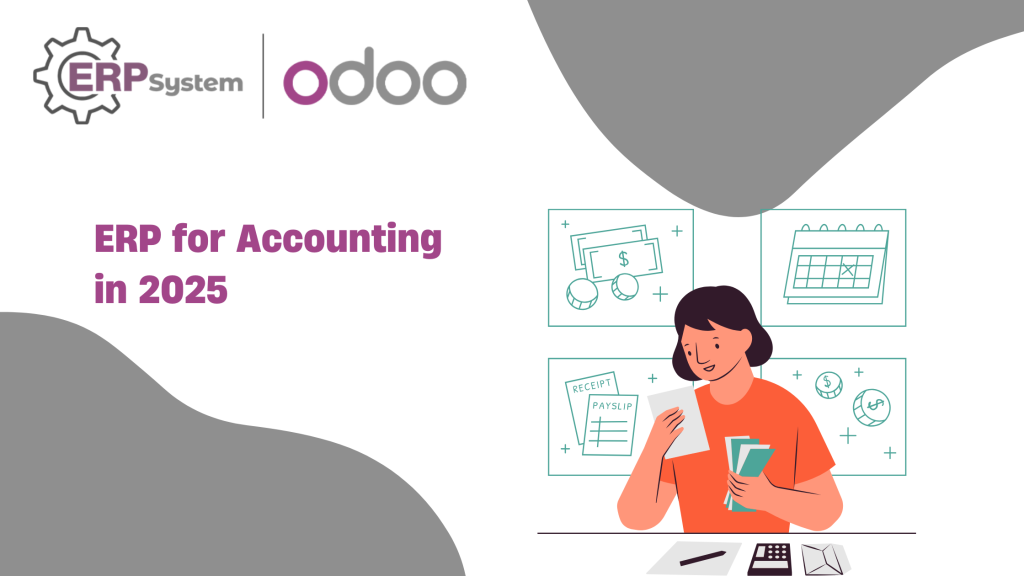
I. Introduction
The best ERP for accounting today must deliver automation, GST/VAT compliance, advanced reporting, cloud access, and seamless integrations to help businesses stay competitive and future-ready.
II. Why ERP is Critical for Accounting in 2025
- Growing compliance requirements – From GST to VAT to e-invoicing, regulatory frameworks are becoming more complex. ERP ensures compliance with minimal effort.
- Demand for real-time visibility – Business leaders want instant insights into cash flow, profits, and liabilities. ERP provides live dashboards and reports.
- Need for scalability – As businesses expand, ERP scales effortlessly while maintaining data accuracy.
Shift to cloud & remote work – With teams working across locations, cloud-based ERP ensures secure, anytime access.
III. 5 Must-Have Features in the Best ERP for Accounting
1. Automation of Accounting Tasks
Automation is the foundation of any modern ERP. Instead of spending hours reconciling accounts or chasing invoices, businesses can rely on ERP to handle repetitive processes.
- Auto-reconciliation of bank statements reduces manual effort.
- Automated invoices & reminders save time and improve collections.
- Error reduction ensures financial accuracy.
- AI-driven forecasting helps predict cash flow and future expenses.
By minimizing manual intervention, businesses free up resources for strategic decision-making.
2. GST/VAT Compliance & E-Invoicing
Tax compliance is one of the biggest challenges for businesses today. The right ERP takes care of it automatically.
- Built-in GST/VAT compliance ensures adherence to local and global tax rules.
- Automatic return preparation simplifies monthly and annual filings.
- Real-time e-invoicing reduces the risk of errors and rejections.
- Stress-free audits with accurate tax data available at a click.
This not only saves time but also protects businesses from penalties and compliance risks
3. Advanced Financial Reporting & Analytics
A business without insights is like driving blind. The best ERP for accounting offers advanced reporting capabilities that go beyond standard P&L statements.
- Real-time dashboards give instant snapshots of financial health.
- Drill-down reports such as balance sheets and cash flow analysis help in deeper evaluation.
- Budgeting & forecasting tools provide future-ready planning.
- SMEs and enterprises alike benefit from data-backed decision-making.
With ERP, financial reporting transforms from a compliance exercise into a strategic advantage.
4. Cloud-Based Accessibility
In 2025, businesses expect to manage finances on the go. Cloud-enabled ERPs deliver exactly that.
- Anytime, anywhere access ensures flexibility for remote teams.
- Role-based access control provides security without restricting collaboration.
- Scalability allows businesses to grow without worrying about infrastructure.
- Automatic backups & disaster recovery secure sensitive financial data.
Cloud-based ERP ensures continuity and efficiency in an increasingly digital-first business world.
5. Seamless Integrations with Other Business Apps
Accounting doesn’t work in isolation. It must connect with sales, HR, payroll, and inventory to deliver a complete picture.
- CRM, HRMS, and payroll integration ensures smooth operations.
- Inventory & banking APIs eliminate duplicate data entry.
- Unified business platform reduces silos and increases efficiency.
- Better decision-making with all business data in one system.
The best ERP ensures smooth connectivity across all departments, creating a single source of truth for the business.
V. Conclusion
As 2025 unfolds, businesses need more than just accounting software—they need intelligent, integrated, and future-ready ERP solutions. The five must-have features—automation, GST/VAT compliance, advanced reporting, cloud accessibility, and integrations—set the standard for the best ERP systems.
The right ERP not only simplifies accounting but also drives compliance, saves time, and empowers smarter growth.